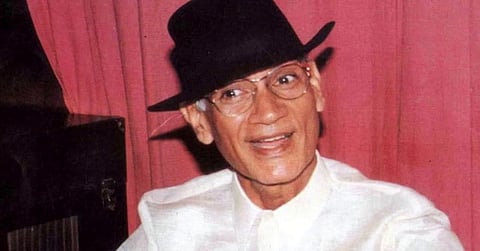
- Home
- Live Blog
- Breaking News
- Top Headlines
- Cities
- NE News
- Sentinel Media
- Sports
- Education
- Jobs

Gautam Ganguly
(gautamganguly2012@gmail.com)
January holds a special place for connoisseurs of Bollywood music and admirers of O.P. Nayyar. As reported widely, the votaries of music across India and even the world have offered heartfelt tribute on 16th January to O.P. Nayyar, the legendary music director, popularly described as rhythm king on the occasion of his 99th birth anniversary. Because O.P. Nayyar breathed his last on 28th January makes the month monumental, defining and sacrosanct for O.P. Nayyar’s admirers. The 28th of January, 2025, marks his 18th death anniversary.
Despite the passage of time, the popularity of O.P. Nayyar’s lilting, foot-tapping compositions has kept soaring encompassing the young, vibrant generations with the immortal tunes. Empirical experiences reveal that ‘dance-friendly’, rhythmic compositions of O.P. Nayyar suit the tastes of fast-pace-loving present generations. Consequently ‘remixed’ versions of OPN songs outscore his equally illustrious contemporary Bollywood colleagues like Shankar-Jaikishan, S.D. Barman and others.
It needs to be reiterated that O.P. Nayyar belonged to the distinguished phase that is unanimously described as the ‘golden era’ of Bollywood film music. To quote Raju Bharatan, one of the finest critics, ‘the golden age of popular Hindi film music lasted from the 1960s to the 1990s. Songs from this era proved to be much more memorable than tunes released in the 21st century.’ This era saw the flourishing of the Hindi film world with legendary music directors like S.D. Barman, Shankar-Jaikishan,Laxmikant–Pyarelal, R.D. Barman, and others. Needless to say, O.P. Nayyar stood on the same platform with his contemporary galaxy of musical genius and curved out an immortal place by his innovative style of composition. All his contemporaries had high regard for him Lata Mangeshkar spoke about OPN with profound regard. To quote Lata ji, ‘Nayyar’s music always carried its distinct mark. His work was different from his contemporaries. One could always identify an OP song.’
Anil Biswas, another famous music director, commented forthrightly, at a time when most music composers were copycats, Nayyar was an original.’
A survey conducted by a group of academics reveals that ‘golden oldies stick in millennials’ minds far more than the relatively ‘bland, homogeneous songs’ of today. It further adds that the youths across the country exhibited remarkable keenness, familiarity and enchantment for the songs of the ‘golden era’. The burgeoning popularity of the song, ‘Pukarta chala hoon mein’, defying the generation gap drives home the point. This song has ‘111.9k views and likes’ in the public domain up to 2019 and it has a whooping record of ‘re-mixed versions. For a music lover, the opening buzz, the instrumental prelude in this song, is mind-blowing and matchless.
Superlative perfection in composing songs based on ‘horse-beat rhythm’ is attributed to O.P. Nayyar’s sky-rocketing popularity in overcoming generation gap syndrome by musical experts. ‘CLIP-CLOP, CLIP-CLOP’, the sound created by the hooves of horses galloping is typical of his characteristic music. To quote famous music critic, Bharadwaj Rangan, ‘GHODA-GAADI BEAT’ had defined the music of an era’. OP Nayyar practically held the patent on this rhythm. ‘Maang ke saath tumhara’ (Naya Daur) and ‘Piya piya piya’ (Baap Re Baap), ‘Zara haule haule chalo’ (Saawan Ki Ghata), Banda parvar, thaam lo jigar (Phir Wohi Dil Laya Hoon) are some of the outstanding, all-time super hit songs composed on this rhythm. However, ‘Yun toh humne lakh haseen dekhe hain’ is unanimously rated as the mother of all horse-beat songs with euphoric, spirit-uplifting musical resonance.
The song, ‘Deewana hua badal’ remains the milestone, the quintessential romantic song to date in the history of Bollywood that revolutionized the very concept and texture of Hindi filmy song. The scintillatingly melodious song is one of the most popular songs irrespective of age, culture, generation and transcending national boundaries. Composed as back as in 1964, this iconic song is one of the top twenty popular songs as per ‘You Tube’ views.
Even neighbouring Pakistan, despite national animosity, takes pride in describing him as the ‘son of Lahore’ having been born there in the year 1926. The rendition of ‘Deewana hua’ by Khalid Baig and Nish Asher, two Pakistani celebrated singers ably supported by breathtaking orchestration, is fantastic and soothing.
O.P. Nayyar’s had a highly egoistic, stubborn uncompromising personality with ‘no-nonsense nature’. A casual follower of Bollywood music will be surprised to know that he never used ‘Lata Mangeskar, the ‘Nightingale of India’, to sing his songs even once in his entire illustrious career and still could win hearts of millions with his melodious compositions.
One article is too small to highlight the greatness, and multidimensional musical brilliance of O.P. Nayyar. I wind up my tribute with the appropriate accolades of Javed Akhtar, ‘Any lover of vintage Hindi film music can identify a Nayyar tune as easily as any art lover would recognize an MF Hussain painting.’ O.P. Nayyar ji had infused unprecedented melody to Bollywood music with his foot-tapping composition. These songs still are evergreen. Time will come and go. Bollywood songs will come and go. But our O.P. Nayyar ji will go on forever.